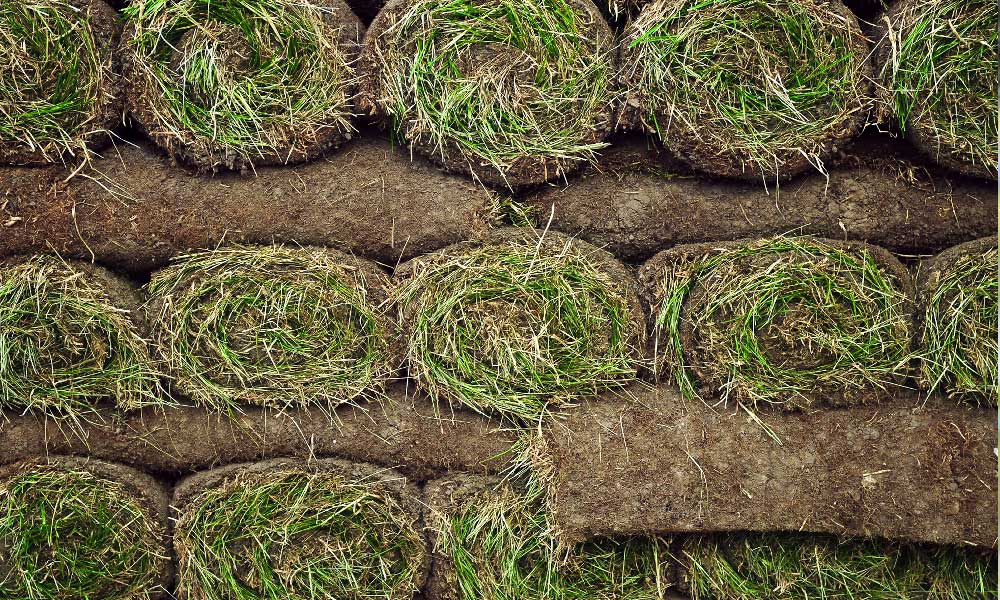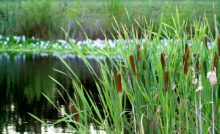Seed, Sand, Sod and Soil


The transition from summer to fall may be well underway at your golf course, bringing with it the promise of quieter months ahead, but do golf course superintendents and turf managers ever truly turn their minds off when it comes to the fundamental components that define their facility? “What’s happening on my course now–what will this winter bring–and how do I (and our club members) envision our course, come next spring?”
Seed, sand, sod and soil are elemental topics that are always in a golf course superintendent’s thoughts. Thankfully, there are many exceptional industry experts to help them deal with the matters at hand as well as with their plans for the future.
Ernst Conservation Seeds
Originally established to help meet the need for soil conservation along interstate highways, three generations later, Ernst Conservation Seeds remains a family-owned and operated business. Founded by Calvin Ernst, this Meadville, Pennsylvania company provides quality native and naturalized plant seeds, mixes, and bioengineering products, including Agrostis stolonifera, creeping bentgrass that is used for soil erosion control, on reclamation sites, on golf course putting greens, and on lawns.
Ernst Conservation Seeds is skilled in helping golf course superintendents, turf managers, and landscape architects deal with unique terrain and drainage issues, including riparian areas, wet meadows and wetlands, woodland openings, pollinators, and steep slopes. Congressional Golf Course and Country Club in Bethesda, Maryland, is one example of a course utilizing Ernst Conservation Seeds’ ERNMX-181, a native steep slope mix with annual ryegrass.
The mission statement of Ernst Conservation Seeds sums up the company’s values well: “To make available to eastern North America the key native and naturalized species of plants for restoration, reclamation, conservation, wildlife and pollinator habitat enhancement, renewable biomass energy and the beautification of our nation.”
You can learn more about this environmentally conscious company on the website www.ernstseed.com
Stock Seed Farms
In 1956, Lyle and Margaret Stock harvested their first acres of Nebraska Certified grass seed. With help and encouragement from the Soil Conservation Service (now the Natural Resource & Conservation Service) and from University of Nebraska personnel, Lyle Stock became a recognized leader in the production and marketing of native grasses and wildflower seed. Today, Stock Seed Farms, run by Dave Stock, proudly acknowledges that its work has contributed directly to protecting millions of acres of land from wind and water erosion and to providing food for domestic animals and food and shelter for wildlife. As the team at Stock Seed Farms explained, “For humans, these same acres have provided food for our eyes, mind and soul.”
Among Stock Seed’s many outstanding products is a relative newcomer: Sundancer Buffalograss. Considered one of the most advanced turf-type buffalograss varieties available to the turf industry today, Sundancer helps serve the demand for a warm-season turf with the accelerated establishment and superior turf quality from seed. Characteristics of this grass include
- Extreme drought tolerance
- Low water and nitrogen usage
- Winter hardiness
- Lateral spread by stolons (runners)
- Low growth habit
Suitable for use on residential lawns, commercial sites, parks and recreational areas, golf courses, and medians, Sundancer requires at least 6 to 8 hours of direct sunlight daily and does best in clay-based or heavy soils. Sandy soils must be amended to support establishment.
Stock Seed Farms reports that in a three-year trial at locations in Arizona, Colorado, Kansas, New Mexico, Utah, Virginia, and Washington, Sundancer excelled in all categories in side-by-side comparisons with other commercially available varieties of buffalograss.
In these studies, Sundancer exhibited
- Establishment rates from seed similar to Kentucky Bluegrass
- Early spring green up
- A darker green color seasonally
- Broad adaption
- Enhanced density and fine leaf texture
- Good fall color retention
- Disease and insect resistance
- A lower plant height, 4-8 inches
To learn more about Sundancer Buffalograss and all the products available from Stock Seed Farms, visit the company’s website at www.stockseed.com.
When the subject is sand on the golf course, most golfers express a preference for bright, white sand. Perhaps the frustration of playing your ball from the bunker is eased by the beach-like serenity of white sand. But have you ever considered, what makes white sand white?
The answer to this question varies depending upon the source of your sand. On the beach in Miami, sand is white primarily because of calcium carbonate from minute particles of fragmented seashells. The famed sugar-white sands of the Florida Panhandle and southern Gulf Coast are white because of a high concentration of finely powdered quartz that originated in the southern Appalachian Mountains and over eons of time worked its way to the ocean floor in the Gulf of Mexico.
Braen Stone Industries
However, in Haledon, New Jersey, where Braen Stone Industries is the largest supplier of white sand in the state, the source of the sand is not the beach. Instead, this five-generation family-owned company, founded in 1904, produces Braen Stone white sand by crushing quarried limestone and washing and filtering it through slotted screens to sizes ranging from 2.36 millimeters to a #200-sieve particle size of 0.074 millimeters.
Washed white limestone quarry sand offers a cost-effective alternative to beach sand and is suitable for use on volleyball courts and in sandboxes, as an ingredient in the manufacture of gunite swimming pools and concrete paving stones and, of course, in golf course bunkers. Sometimes described as white masonry sand, Braen Stone white sand is tested by Hummel & Co. Inc. to meet the golf industry’s suggested standards for particle size and shape.
You’ll find Braen Stone Industries white sand in use on courses across New Jersey and New York, including the facility ranked by Golf World Magazine as the No. 1 course in New Jersey, the Ballyowen Golf Course in Hamburg. Braen Stone Industries is a member of the New Jersey Chapter of the Golf Course Superintendents Association (GCSAA). To find out more about this company, visit their website at www.braenstone.com.
Bethel Farms
Describing its business as “growing since day one,” Bethel Farms got its start in 1958 as a small cattle and poultry operation in Central Florida. Over the years, Bethel Farms has become an agricultural leader in Florida, producing cattle, citrus, sod and grass plugs. Now with multiple farm sites, including Arcadia, Ft. Pierce and Sumterville, Florida, the company ships to 14 southeastern and mid-western states.
Offering a solution-oriented approach, the team at Bethel Farms is constantly looking for new ways to solve old problems. As Mike Pope, Bethel’s National Sales Manager, said, “We really do try to anticipate our customers’ needs and bring them solutions. We are no longer just trying to grow what other people are specifying; we are identifying and growing the varieties that solve their problems and help build their businesses.”
Today, Bethel Farms continues to grow in new directions. Find out more at bethelfarms.com.
Soil Technologies Corporation
In the management of golf greens, soil is never just soil. The soil at all golf courses must be a dynamic ecosystem of both living and non-living matter that continually interacts in complex and interwoven ways. In fact, a single sampling of healthy soil will include billions of different organisms with more diversity and abundance of life than is contained within any other type of ecosystem recognized in the world today.
With this information in mind, earlier this year, Soil Technologies Corporation launched TurfTech Bio-Mega, a product that builds on the technology, science, and success of previous TurfTech branded products. This new microbial ecosystem is an enhancement of the original TurfTech formula developed by Soil Technologies in the 1980s in conjunction with Dr. Fred Williams at Iowa State University. Designed to make golf course superintendents’ jobs easier, the TurfTech product line offers a broad-spectrum bio-inoculant that is an effective alternative to chemical inputs.
With ninety-nine percent of the minerals available to plants in the root zone existing in forms that can only be absorbed by roots within healthy soil environments, TurfTech Bio-Mega functions as more than a biostimulant and is distinctive from seaweed products or humic acid. TurfTech Bio-Mega delivers billions of beneficial microorganisms directly to your soil.
The Vice President of Soil Technologies Corp., Steve Nichols, explained, “Since 1986, turf managers worldwide have trusted TurfTech products to reduce soil compaction, inhibit turf diseases, and cut fertilizer requirements. Now, TurfTech Bio-Mega is available to turf managers who are seeking a total microbial ecosystem for transforming the rhizosphere and improving turf performance under all kinds of challenging conditions.”
With TurfTech Bio-Mega, golf courses are seeing:
- Improved turfgrass rooting, better plant growth and vigor, improved plant health and improved soil structure and fertility.
- Cost and environmental savings realized when using less fertilizer and fewer chemicals.
- Better playability and ball roll that makes golfers smile!
For more than three decades, Soil Technologies Corp. has been a recognized leader in the production and distribution of bio-rational pest management and plant growth products for agricultural and horticultural crops. Offering unique, minimum-risk products for growers, landscapers and golf courses, and other sport turf managers, Soil Tech produces only ecologically safe and effective technologies. Learn more at the company’s website: www.SoilTechCorp.com.
Recent Posts
South Carolina State Leaders Honor Green’s Superintendent Career
South Carolina’s House of Representatives today honored the career of golf course superintendent Chuck Green.…
Branson, Missouri: 5 Reasons Why it is a Must-Visit Travel and Golf Destination
Branson, Missouri, is booming as a must-visit destination for golf enthusiasts and travelers alike. Nestled…
Preview more than 1,000 rounds of golf available in GCSAA’s Rounds 4 Research online auction
The Golf Course Superintendents Association of America (GCSAA) Rounds 4 Research program offers golfers the…
EcoBunker Synthetic Revetting More Sustainable than Natural Turf*
*A recent report by the Welsh government has found that EcoBunker synthetically revetted bunkers have…
SiteOne® Hires Dan Carrothers as VP, Agronomic Business Development
SiteOne® Landscape Supply is pleased to announce Dan Carrothers as the new Vice President for…
Superintendents Online Turf Directory – EVERYTHING TURF
Our online directory, directory.GolfCourseTrades.com is the go-to resource for the busy superintendent. It is your opportunity…



